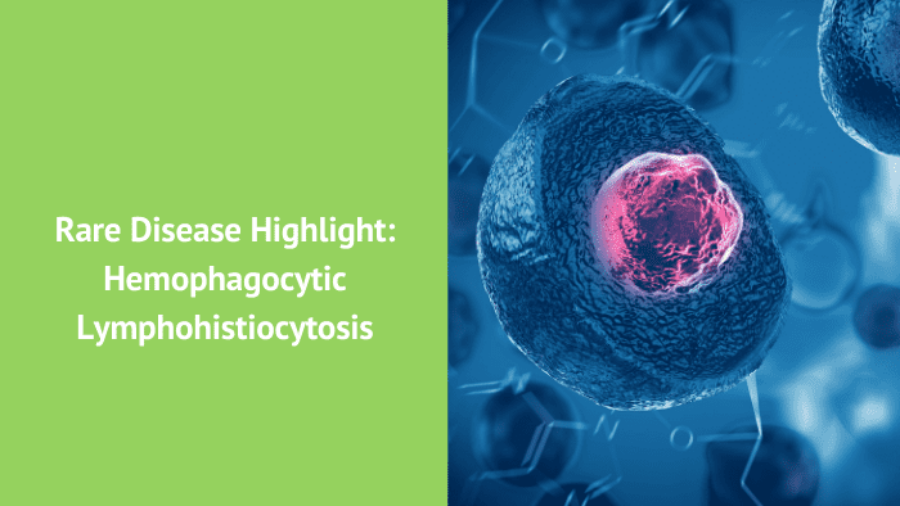Hemophagocytic Lymphohistiocytosis (HLH) is a rare and potentially fatal disease characterized by chronic systemic inflammation due to immune overactivation (Al-Samkari et al., 2018). Immune overactivation results from the uncontrolled growth of immune system cells; histiocytes and lymphocytes. These cells produce excessive amounts of cytokines, small proteins that signal the immune system to work. The overproduction of cytokines is known as a cytokine storm and leads to cytokine-mediated tissue injury and multiorgan failure, resulting in death (Griffin et al., 2020). There are two distinct groups of HLH: familial or primary HLH and acquired or secondary HLH. Primary HLH is genetic, passed on from parents to children, and mainly diagnosed in children during their first year of life (Al-Samkari et al., 2018). Secondary HLH presents with a later onset in older patients without inherited genetic mutations and it appears triggered by an underlying condition including viral or bacterial infections, hematologic malignancies, autoimmune diseases, and medication exposure (Allen et al., 2015; Brisse et al., 2015).
The key symptoms of HLH include unremitting high fever, enlargement of certain organs mainly liver and spleen, liver failure, swelling of the lymph nodes, neurological syndromes such as seizures, central nervous system dysfunction, nonspecific gastrointestinal symptoms, and dermatologic manifestations such as rash. In severe cases, cardiopulmonary involvement induces low blood pressure and respiratory failure (Al-Samkari et al., 2018; Esteban et al., 2017; Griffin et al., 2020). HLH progresses quickly and patients with nonspecific symptoms of inflammation rapidly become seriously ill (Allen et al., 2015). Currently, the standard of care (SOC) for HLH involves the use of immunosuppressants, anti-inflammatory agents, chemotherapeutic agents, and antibiotics or antivirals to control the triggering infection, as developed by the Histiocyte Society (George, 2014). The main SOC involves the use of a cytotoxic and mutagenic therapy, which can result in cell damage or death, gastrointestinal toxicity, and development of complications including acute myeloid leukemia (Bergsten et al., 2017; Lawrence, 2021; Machowicz et al., 2020). The treatment aims to prepare patients for hematopoietic stem cell transplantation (HSCT), the only curative option for HLH, but unfortunately up to 25% of children are ineligible for HSCT due to advancing disease. Additionally, HSCT results in death in 30% of cases mainly due to pulmonary and liver complications or graft versus host disease. Patients who undergo and survive transplant have the best prognosis but might suffer long-term side effects including cognitive and growth delay, hearing impairment, and obstructive lung disease (George, 2014; Griffin et al., 2020).
Despite advancements in treatment, HLH remains a serious and life-threatening disease. HLH patients require aggressive treatments with no guarantee of full remission. In children, a highly invasive transplant is the only curative option and even then, patients might be left with serious side effects for the rest of their lives. In adults, the prognosis remains poor, with mortality rates of 41-88% following treatment, due to the delayed diagnosis and unspecific treatment regimen, which is directly extrapolated from pediatric guidelines (Griffin et al., 2020; Konkol, 2021). There is a significant unmet medical need in this patient population. The development of new less aggressive therapies that can avoid invasive procedures, reduce remission rates, and improve survival rates is essential.
References used
- Al-Samkari, H., & Berliner, N. (2018). Hemophagocytic Lymphohistiocytosis. Annu Rev Pathol, 13, 27-49. doi:10.1146/annurev-pathol-020117-043625
- Allen, & McClain, K. L. (2015). Pathophysiology and epidemiology of hemophagocytic lymphohistiocytosis. Hematology, 2015(1), 177-182. doi:10.1182/asheducation-2015.1.177
- Bergsten, E., Horne, A., Aricó, M., Astigarraga, I., Egeler, R. M., Filipovich, A. H., . . . Henter, J.-I. (2017). Confirmed efficacy of etoposide and dexamethasone in HLH treatment: long-term results of the cooperative HLH-2004 study. Blood, 130(25), 2728-2738. doi:10.1182/blood-2017-06-788349
- Brisse, E., Wouters, C. H., & Matthys, P. (2015). Hemophagocytic lymphohistiocytosis (HLH): A heterogeneous spectrum of cytokine-driven immune disorders. Cytokine Growth Factor Rev, 26(3), 263-280. doi:10.1016/j.cytogfr.2014.10.001
- Esteban, Y. M., de Jong, J. L. O., & Tesher, M. S. (2017). An Overview of Hemophagocytic Lymphohistiocytosis. Pediatr Ann, 46(8), e309-e313. doi:10.3928/19382359-20170717-01
- George, M. R. (2014). Hemophagocytic lymphohistiocytosis: review of etiologies and management. J Blood Med, 5, 69-86. doi:10.2147/jbm.S46255
- Griffin, G., Shenoi, S., & Hughes, G. C. (2020). Hemophagocytic lymphohistiocytosis: An update on pathogenesis, diagnosis, and therapy. Best Pract Res Clin Rheumatol, 34(4), 101515. doi:10.1016/j.berh.2020.101515
- Konkol, S. (2021). Lymphohistiocytosis. StatPearls [Internet]. Treasure Island (FL): StatPearls Publishing.
- Lawrence, L. (2021). Hemophagocytic Lymphohistiocytosis: would you know it if you saw it? American Society of Hematology (ASH) Clinical News.
- Machowicz, R., & Basak, G. (2020). How can an internal medicine specialist save a patient with hemophagocytic lymphohistiocytosis (HLH)? Pol Arch Intern Med, 130(5), 431-437. doi:10.20452/pamw.15226
BioPharma Global is a mission-driven corporation, operating like a not-for-profit, dedicated to using our FDA and EMA regulatory expertise and knowledge of various therapeutic areas to help drug developers advance treatments for the disease communities with a high unmet medical need. If you are a drug developer seeking regulatory support for Orphan Drug designation, Fast Track designation, Breakthrough Therapy designation, other FDA/EMA expedited programs, type A, B (pre-IND, EOPs), or C meeting assistance, or IND filings, the BioPharma Global team can help. Contact us today to arrange a 30-minute introductory call.

